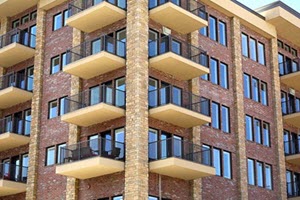Posted in Blog, George H. Thompson, News & Articles, Real Estate

Most residential tenants are not legally required to vacate the rental unit where they are living when their lease term expires. In 2005, the New Hampshire Supreme Court said the landlord must evict the tenants if she wants them to leave. AIMCO Props. v. Dziewisz, 152 N.H. 587 (2005). So, if a landlord and a tenant have a one-year lease expiring on December 31, 2020, the tenant is not legally required to move out on or before December 31, 2020. If the tenant remains in the unit after December 31, 2020, the tenancy changes from a leasehold tenancy to a tenancy at sufferance under the same terms, except the term itself which will then be month to month.
This Supreme Court case does not apply to commercial/business tenants or residential tenants renting single family houses owned by a landlord who does not own more than three (3) single family houses at that time. It also doesn’t apply to rental units containing up to four (4) dwelling units when the owner also lives there, or a single family house owned by a bank or other mortgagee after a foreclosure. See RSA 540:1-a, I.
Assuming one of these narrow exceptions does not apply and the tenant does not voluntarily leave on or before December 31, 2020, the landlord must evict the tenant and have “good cause” to do so. “[G]ood cause” is defined in RSA 540:2, II, and IV as follows:
- Non-payment of rent (RSA 540:2, II(a));
- Causing damage to the property (RSA 540:2, II(b);
- Failure to comply with a lease term (RSA 540:2, II(c);
- Behavior affecting the health or safety of other tenants or the landlord or refusing to relocate when lead paint is being removed (RSA 540:2, II(d);
- Failure to leave to allow landlord to remove lead paint (RSA 540:2 II(f);
- Failure to prepare the unit for extermination of bugs or rodents; (RSA 540:2 II(g); or
- Refusal to agree to a rent increase in a month-to-month tenancy (RSA 540:2, IV).
But these “good cause” reasons to evict are applicable whether or not the lease term has ended. What if none of the above apply and the landlord just wants the tenant to leave at the end of the lease term, but he won’t? Well, RSA 540:2, II (e) and V say a landlord can evict a tenant for “other good cause” (emphasis added) which “includes, but is not limited to, any legitimate business or economic reason.” For example, in the case J.P. Morgan Chase Bank, N.A. v. Heilan Grimes, 167 N.H. 536 (2015), the New Hampshire Supreme Court decided that an eviction for the purpose of marketing a property for sale without tenants occupying it met the “other good cause” requirement of RSA 540:2, II(e) and V. Unfortunately, the statute does not further define “other good cause” and there haven’t been any other New Hampshire Supreme Court cases defining other specific reasons that would comply with the “other good cause” requirement. This leaves landlords in the awkward position of trying to determine what is and what is not a “legitimate business or economic reason.”
At Welts, White & Fontaine, P.C., we represent landlords in both residential and business/commercial evictions. Simply contact us and we will tell you how we can help you.
Author: George H. Thompson Jr.
This blog is intended for informational use only. The information contained herein should not be construed as offering legal advice or a legal opinion.
